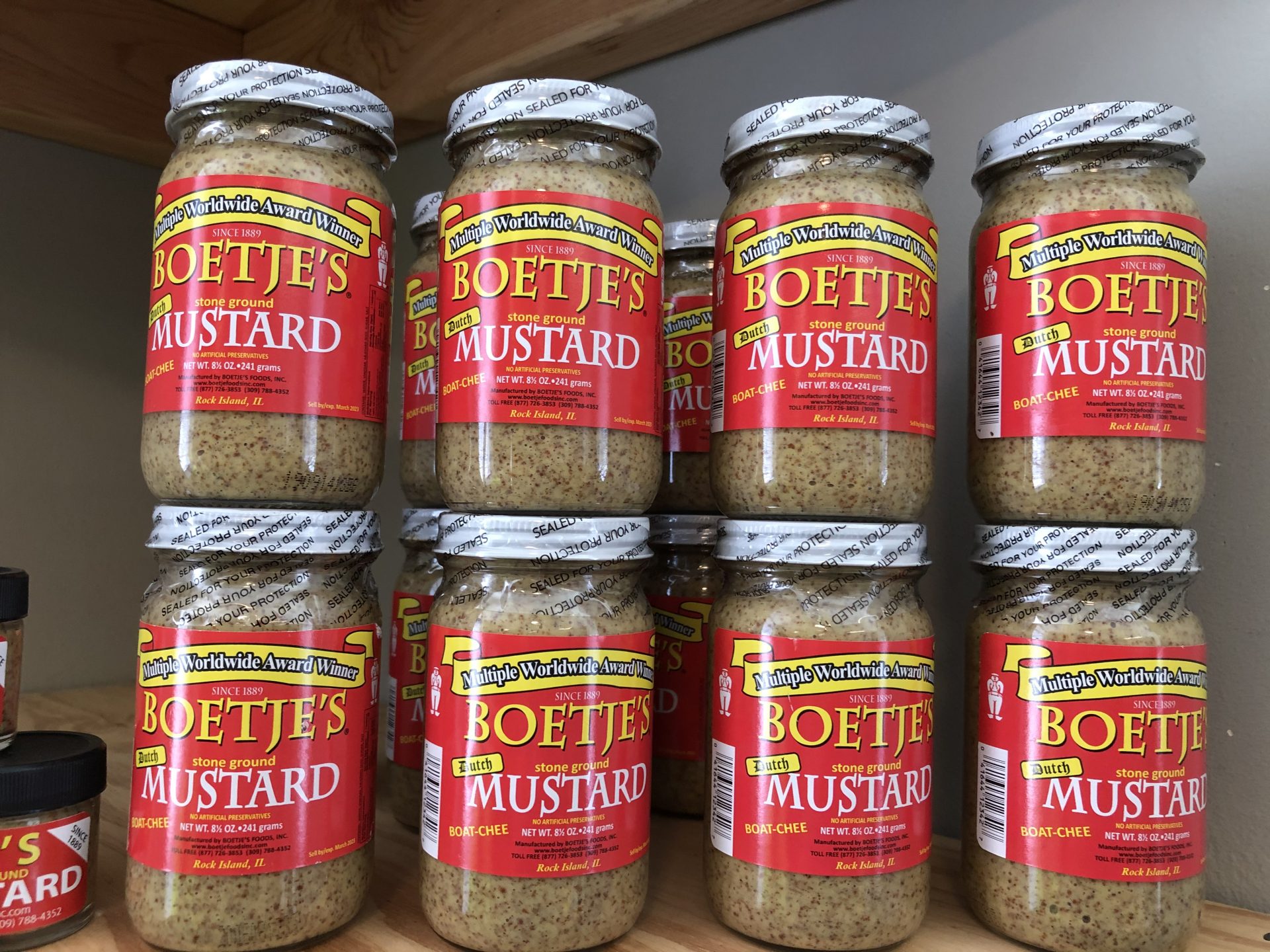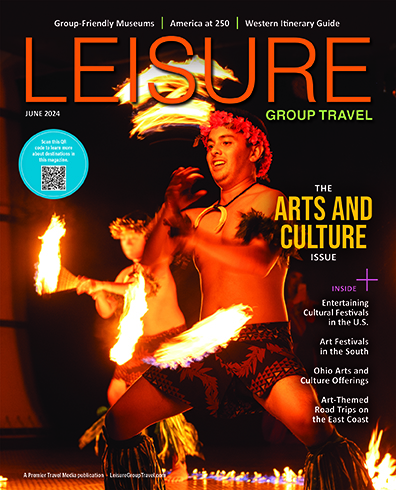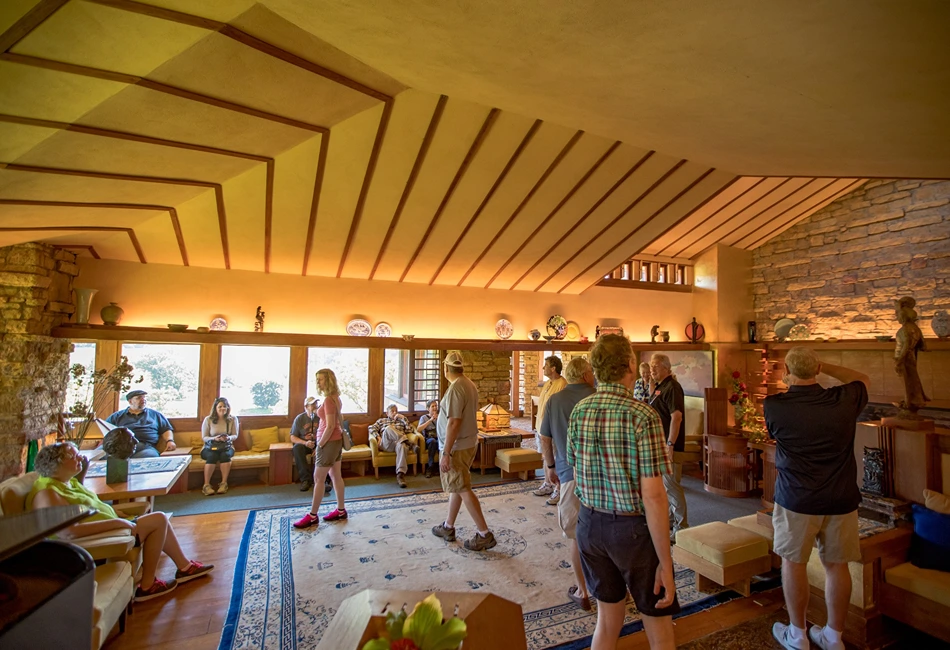Factory tours, museums and other crowd-pleasers lure travelers to the Mississippi River shores of western Illinois and eastern Iowa
In a small, unassuming brick building on a quiet street across from a cemetery in Rock Island, Illinois, bus groups are introduced to the wonderful world of stone-ground mustard on tours that reveal how the tangy condiment is made from an old Dutch recipe.
Tours with mustard sampling at quirky little Boetje’s Foods, Inc. are just one of many options awaiting groups in the Quad Cities metro area of Illinois and Iowa. Riverboat excursions, shopping, live entertainment, museums and other see-it-made factory tours present itinerary planners with a host of choices that could easily fill a week.
Straddling the Mississippi River, the Quad Cities consists of Rock Island, Moline and East Moline in Illinois and the Iowa cities of Davenport and Bettendorf. (Yes, that’s five municipalities, not four, but it’s a story too long to explain right here.)
The Art of Mustard-Making
Will Kropp purchased Boetje’s Foods in 1984 and operates the mustard factory with his son Harrison and a part-time employee. They use an Old World recipe developed in 1889 by Fred Boetje (pronounced “Boat-chee”), a German immigrant who made mustard in his garage and delivered it door to door; from a wooden box he would fill customers’ containers for a nickel. (Boetje is buried in the neighboring cemetery.)
Kropp explains the simple manufacturing process, which blends brown mustard seed from Alberta, Canada, with water, distilled white vinegar, sugar and salt in a 5,000-gallon oak tank that dates to the 1920s. Visitors also see the grinding room, where the seeds are cracked open, and the automatic equipment in the bottling/labeling room. The mustard is aged in wooden barrels.
Besides the original variety, Boetje’s makes mustards flavored with honey, maple syrup and Uncommon Stout, a dark brown beer made by local favorite Bent River Brewing Company. It also produces bourbon and rum barrel-aged mustards. Samplings for tour groups ($4 a person, maximum 25) include pretzels and cold drinks. Jars of mustard are available for purchase in the gift shop.
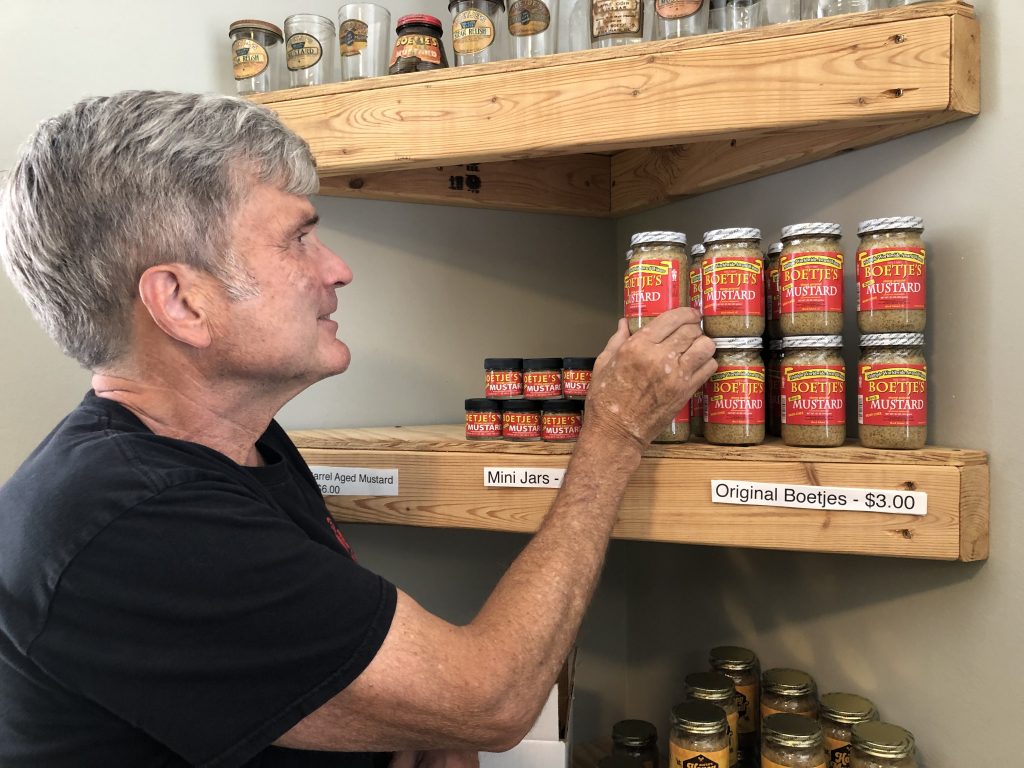
Will Kropp takes pride in his prize-winning mustards. (Randy Mink Photo)
Boetje’s mustards are sold at grocery stores in 26 states but are most commonly found in the Upper Midwest. The Hy-Vee supermarket chain is its biggest customer. The mustards have won many national awards.
Skilled Artisans Create Keepsake Sculptures
Tours of Isabel Bloom Studio in Davenport give a peek into the artistic process that goes into another locally made creation—cast-concrete sculptures. Handcrafted by skilled artisans, the sentimental and whimsical pieces portray subjects ranging from angels and gnomes to children and animals.
Isabel Bloom (1908-2001), a Davenport native, studied under the famous regionalist artist Grant Wood at the Stone City (Iowa) Art Colony during the summers of 1932 and 1933. She then took ceramics classes and bought a kiln for the studio she created in the basement of her Davenport home, starting out sculpting with clay before switching to concrete. In the 1950s Bloom hosted a children’s art program on local television.
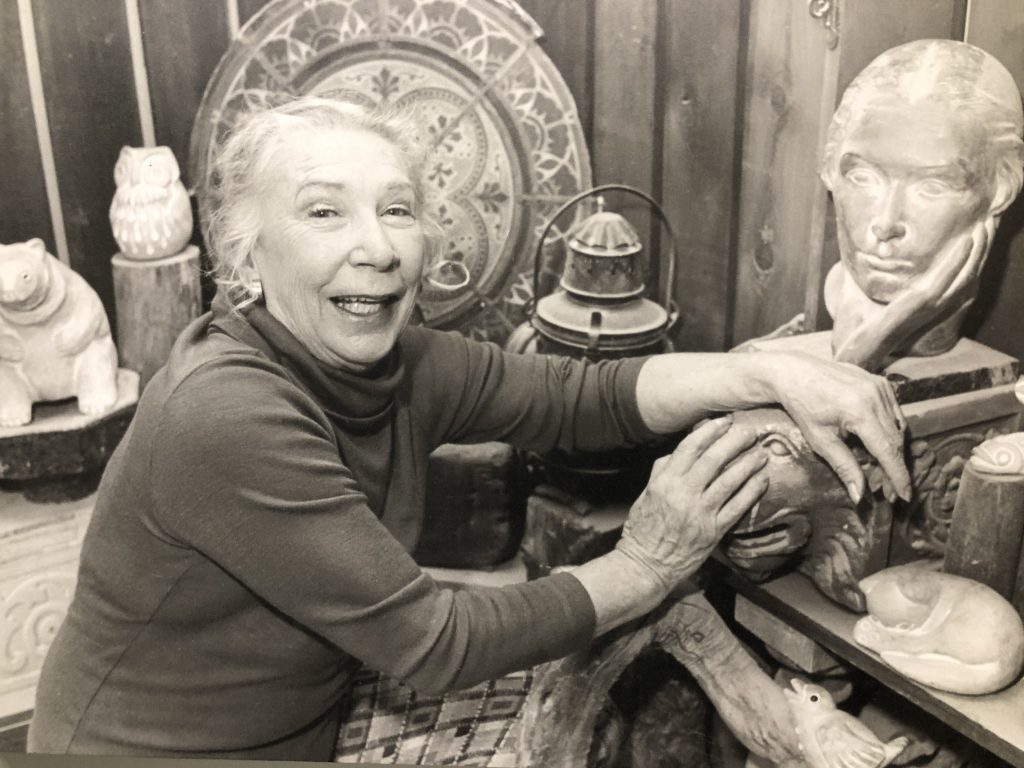
The cottage business that artist Isabel Bloom started in her basement in the 1930s blossomed over the decades into a thriving company.
As her business grew, Bloom rented a house for her studio and hired assistants. Although she sold the company in 1981 at the age of 73, she continued to design new sculptures for the next 10 years. Today her protégé, Donna Young, who joined the firm in 1981, is the sole designer. Every year Young does 25 to 35 new designs, and about that many are retired. Some of Bloom’s original designs, such as an owl, a daisy and mourning dove, are still part of the product line.
Tours of the studio, now housed in a large industrial-looking building, include the short video “The Making of an Isabel Bloom Sculpture” and take visitors on a walk through the studio as each step in production is explained, from mold-making to painting. Tour groups come right up to the painters at work. Each piece takes two to four days to complete. No two are exactly alike.

Tours of the Isabel Bloom Studio provide close-up looks at the sculptures being painted. (Randy Mink Photo)
The studio’s gift shop offers the whole range of Bloom sculptures for both indoor and outdoor placement. Popular items include crosses, angels, owls, butterflies and cats. Some pieces are for special occasions (sympathy, weddings), and some are seasonal, such as snowmen and Christmas ornaments. Bloom creations are sold in 20 to 30 shops in the Midwest and also are available via mail order.
Isabel Bloom Studio’s make-and-take sessions for groups have been discontinued during the pandemic but could resume at a later time.
The Legacy of John Deere
Plant tours of John Deere Harvester Works in East Moline have been halted due to the current coronavirus pandemic but remain on group planners’ radar for future trips. The 1½-hour tour provides a behind-the-scenes look at how combines and other heavy equipment are manufactured.
To get their John Deere fix, however, groups can still visit the free-admission John Deere Pavilion, a glass-sided building in downtown Moline that displays the brand’s big agricultural, construction and forestry equipment along with vintage tractors and other machines. Visitors can climb into the cabs of vehicles, test their skills in state-of-the-art dozer and excavator simulators, and enjoy other hands-on features. Exhibits highlight Deere history, today’s innovations and the company’s commitment to feed the world. The adjacent John Deere flagship store sells toys, gadgets, logo wear and other branded items in Deere’s signature colors of green and yellow.
In the Overlook District of Moline, two historic homes that once belonged to John Deere’s descendants are open for tours. Points of interest at the Deere-Wiman House, with its seven acres of formal gardens and walkways, include an elevator believed to date from the 1890s, a Kimball pipe organ (circa 1910-1920) in the library, and a multi-nozzle spa shower reminiscent of the healing hot spring resort waters popular during the Victorian era. The organ installed at the Butterworth Center, just a block away, was probably one of the largest pipe organs in the Midwest. Another special feature is the library’s 18th century ceiling painting from Venice, one of only six known Venetian ceiling paintings existing in the United States today.
Native Heritage and Natural Beauty
In a stone lodge building high above the Rock River in Rock Island resides the John Hauberg Indian Museum at Black Hawk State Historic Site, a state park. Besides dioramas featuring life-size figures, the free-admission museum displays a tomahawk and two pipes that belonged to the famous Sauk warrior Black Hawk (1767-1838), a dugout canoe and other Indian relics. At the other end of the building, interpretive panels and a 20-minute video chronicle the efforts of men employed by the Civilian Conservation Corps (CCC) to plant trees and build trails, bridges, stone picnic shelters and portions of the lodge during the Depression in the 1930s. Especially interesting are the recorded interviews with workers who recall their days living in barracks at the site for 18 months and the camaraderie they shared with men of different races and religions.
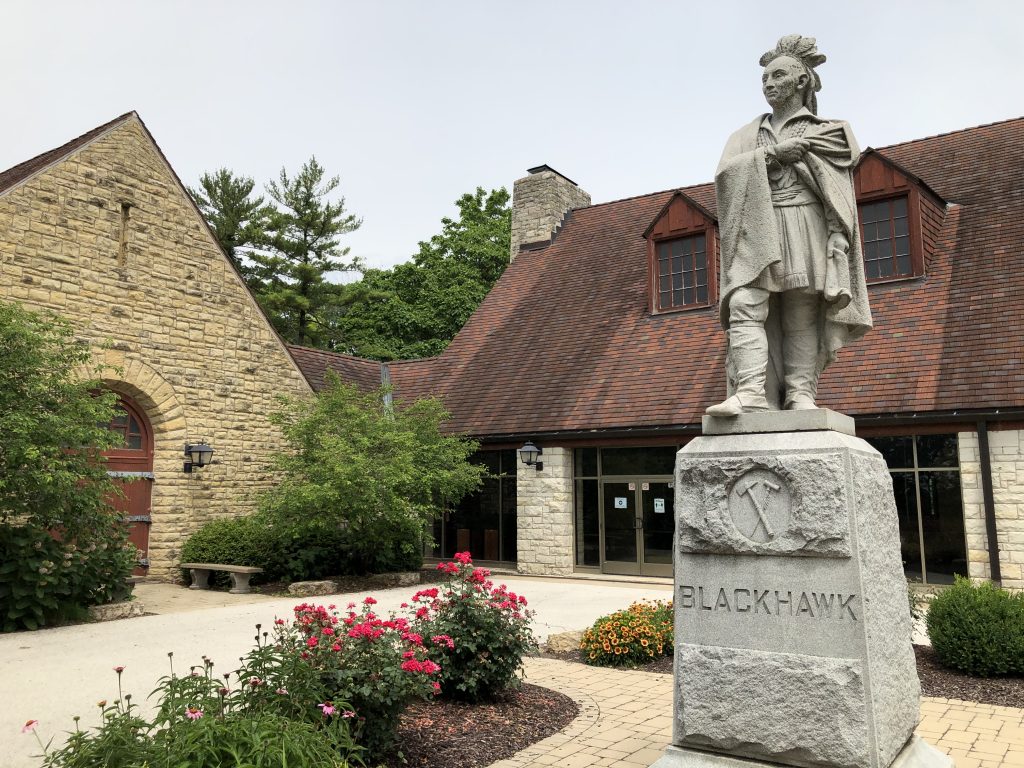
A statue of Sauk warrior Black Hawk stands on the patio of the lodge at Black Hawk State Historic Site in Rock Island. (Randy Mink Photo)
The most scenic hiking trail at Black Hawk State Historic Site leads from the lodge to a bluff overlooking the Rock River. Exploring the park, visitors learn from information kiosks that from 1891 to 1925 the pretty riverside setting was Black Hawk Watch Tower Amusement Park. Owned and operated by a streetcar company, it was located at the end of the line and offered free admission. The most popular ride was Shoot the Chutes, a toboggan ride with flat-bottomed boats that slid down a greased wooden track into the river. Invented in Rock Island in 1884, the ride was found at amusement parks around the country.
Baseball, Theater and River Cruises
Today, entertainment options in the Quad Cities abound. From May to September at Modern Woodmen Park on downtown Davenport’s attractive Mississippi riverfront, the Quad Cities River Bandits, the High-A minor league team of the Kansas City Royals, compete against teams like the Lansing Lugnuts, Peoria Chiefs and Wisconsin Timber Rattlers. The family-oriented park features a Ferris wheel and other amusements.
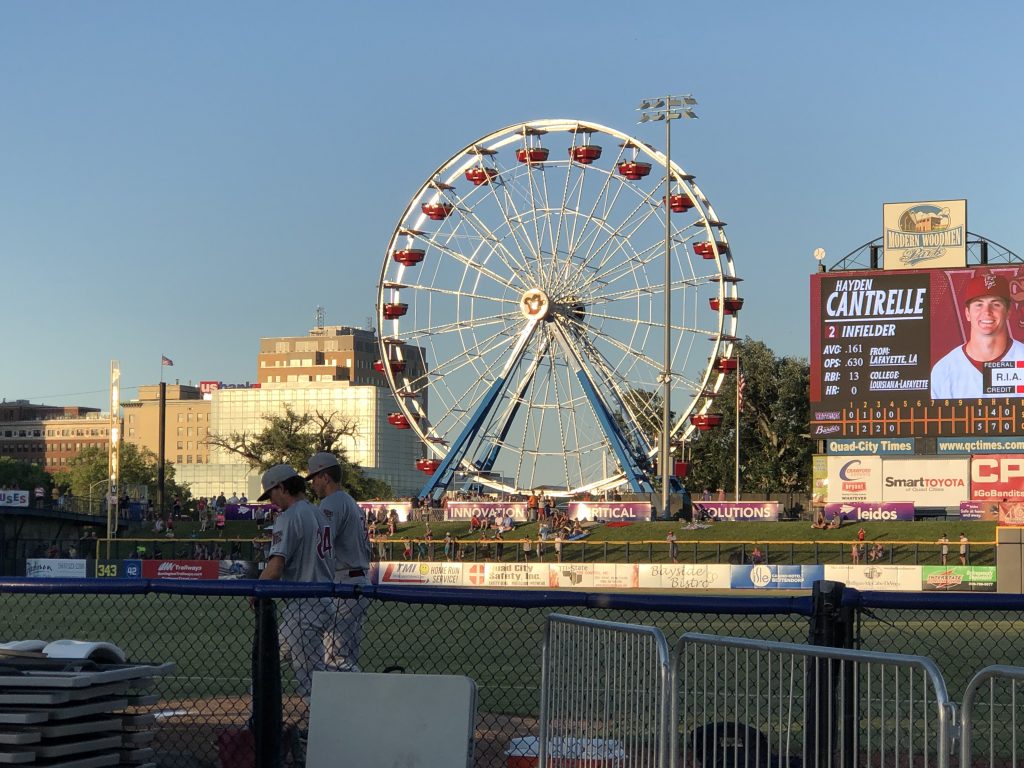
Baseball fans at Davenport’s Modern Woodmen Park, home to the minor league Quad Cities River Bandits, can take a break from the action and view the Mississippi riverfront from a Ferris wheel. (Randy Mink Photo)
Circa ’21 Dinner Playhouse presents Broadway-style musicals and other shows in a restored 1921 vaudeville-movie theater in downtown Rock Island. The 2022 playlist includes Just Desserts: A Musical Bake-Off, Disney’s Beauty and the Beast, Clue: The Musical (based on the classic board game) and Disaster!, a hilarious homage to 1970s disaster films. Groups are offered personalized service, complimentary tickets for escorts and drivers, and home-baked cookies to take home.
Celebration River Cruises’ 750-passenger Celebration Belle, another favorite with groups, offers sightseeing, lunch and dinner cruises that sail out of Moline from April through October. Themed music lunch cruises on the largest non-gaming boat on the Upper Mississippi include “Classic Oldies” (1950s and ’60s), “Hits of the Decades” and “Broadway & Movie Tunes.”
LeClaire: A Delightful River Town
Groups also can tap into the rhythms of the river on Riverboat Twilight, a Victorian-inspired steamboat replica that offers 1½-hour sightseeing cruises from LeClaire, Iowa, a historic town just north of the Quad Cities. On the narrated excursion to Princeton and back, passengers are regaled with river lore and might even get glimpses of eagles in the trees or North American white pelicans on the water. From deck chairs on three levels, it’s not uncommon to see grain-filled barges bound for St. Louis and New Orleans.
Outfitted with stained glass, florid carpeting and white wrought-iron railings, the stylish Twilight also offers a two-day cruise roundtrip from LeClaire to Dubuque, Iowa. The package, available from early June to late October, includes meals, live entertainment, a hotel overnight in Dubuque and admission to the National Mississippi River Museum & Aquarium. The boat’s ticket booth and waiting area is the historic City of Baton Rouge, a former Mississippi River car ferry that operated from 1916-1970.
Adjacent to the riverboat dock is the Buffalo Bill Museum, a repository of local history that includes a rare 1868 sternwheel steamboat. Some exhibits spotlight the career of William F. “Buffalo Bill” Cody, the famous frontiersman, Army scout and showman who toured the U.S. and Europe with his Wild West show. Cody was born in LeClaire Township in 1846, and the Buffalo Bill Cody Homestead in Princeton preserves the stone farmhouse where he lived as a boy. Group tours of the home, filled with furniture typical of the period, can be arranged. Buffalo graze in the adjacent pasture.
Groups can spend several hours drifting from shop to shop along Cody Road, the main street of LeClaire. Wares range from antiques and collectibles to kitchen gadgets and gourmet foods. Shameless Chocoholic tempts with decadent truffles, butter creams, toffee and fudge, while Kernel Cody’s Popcorn Shoppe seems to have every flavor under the sun. LeClaire Olive Oil Co. invites shoppers to sample extra virgin olive oils and balsamic vinegars from around the world. LeClaire Canning Company is the place for salsas, sauces and preserves.
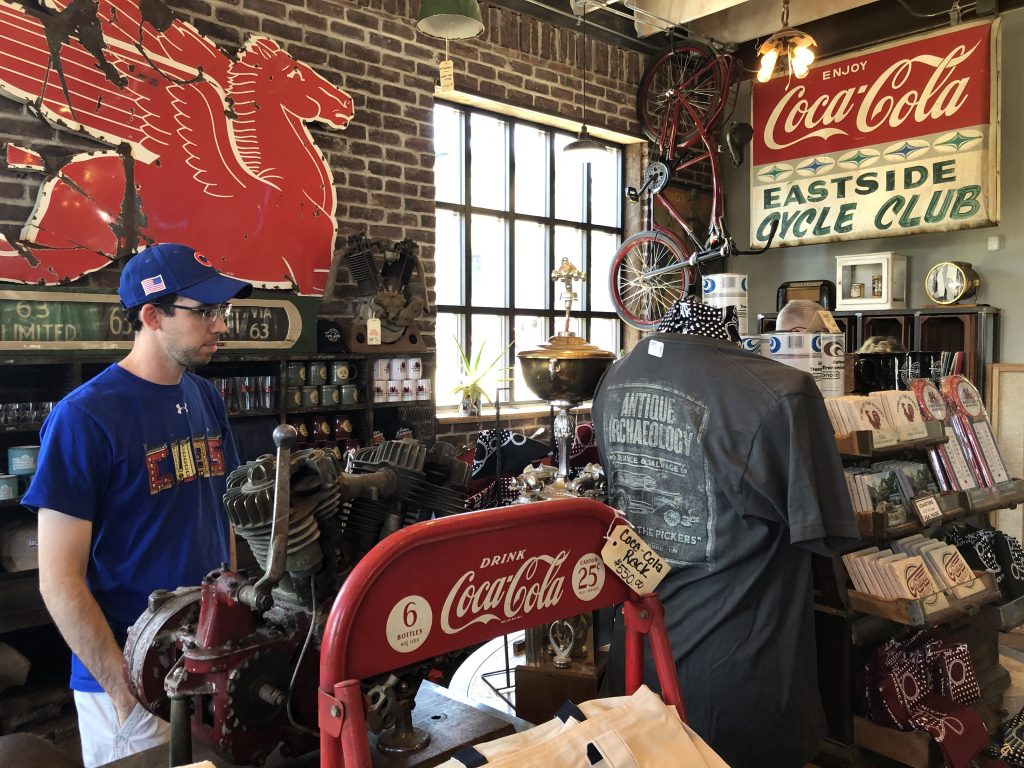
The Antique Archaeology store in LeClaire, Iowa, is owned by the star of a favorite History Channel show. (Randy Mink Photo)
A half block up the hill from Cody Road, fans of the History Channel’s “American Pickers” flock to Antique Archaeology, the store of the show’s Mike Wolfe. You might see some vintage advertising signs and other valuable antiques for sale or just on display, but most of the affordable items are Antique Archaeology caps, T-shirts, magnets and other logo merchandise.
For a small town, LeClaire is loaded with cafes, coffee shops, wine bars and restaurants. Drink in river views from the patios of the Bier Stube (German fare), Mississippi River Distilling Company (which offers tours with tasting) and Green Tree Brewery. The town on the opposite bank is Port Byron, Illinois, which competes with LeClaire every August in Tug Fest, a three-day festival highlighted by a monumental tug-of-war across the Mississippi. The rope spanning the river measures 2,700 feet and weighs 680 pounds.
Lumber Lore and Fruit of the Vine
Clinton, Iowa, up the river from LeClaire, also complements Quad Cities regional itineraries that follow the Great River Road, a national byway. The Sawmill Museum highlights Clinton’s heyday as a lumber center from 1870-1900, when logs floated down from Wisconsin’s northwoods were sawn into lumber, a commodity shipped across the country by rail. Guests can meet animatronic lumber barons, tour replica lumberjack cabins and captain a floating log raft simulator. On a water table they can guide a toy log raft from the forests of Wisconsin to a Clinton sawmill. A sawing machine demonstration can be arranged for groups. The Curtis Mansion, the only lumber baron home that remains in Clinton, is open for tours.
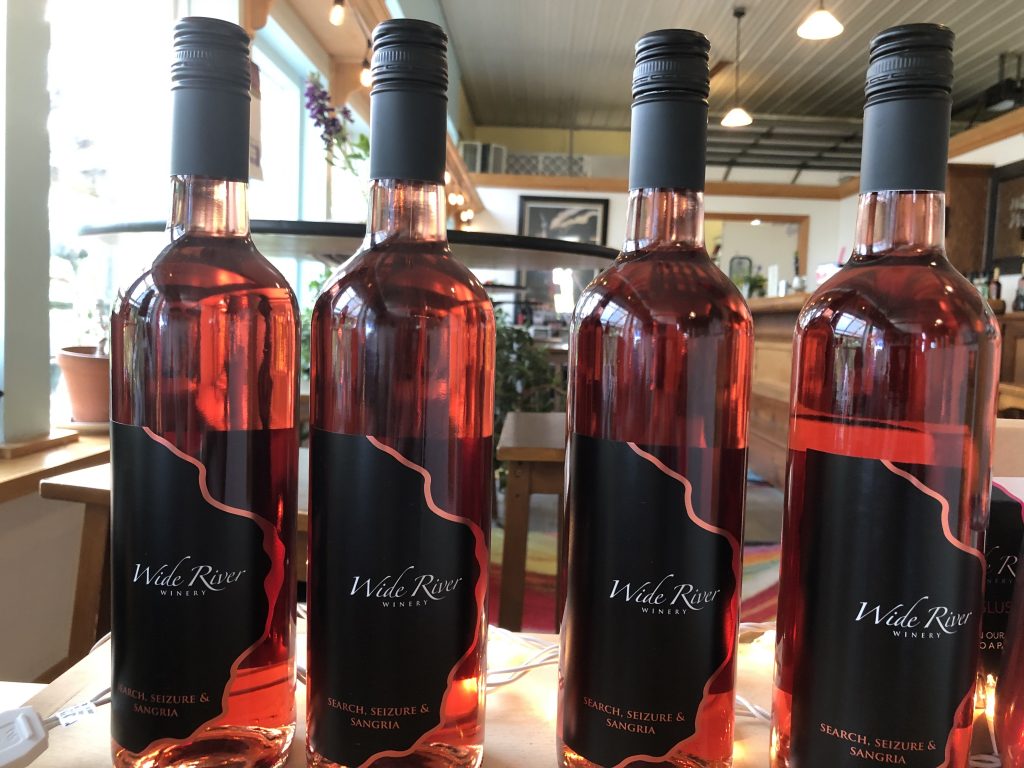
Groups can sip, snack and pick up a bottle or two at Wide River Winery in Clinton, Iowa. (Randy Mink Photo)
On a bluff overlooking the Mississippi is Clinton’s Wide River Winery. Groups can tour the winery and enjoy wines with snacks on a peaceful deck set high above a ravine. The owner, Dorothy O’Brien, is a lawyer, and her husband is a retired judge. As a nod to their profession, Wide River’s whites and reds bear names like White Collar Crime, Caught Red Handed, Repeat Offender, So Sue Me Sue, Double Jeopardy, Not Guilty and Sweet Justice. The wine slushies are a real treat. Wide River has tasting rooms in LeClaire and the Village of East Davenport.
For more information on travel in the Quad Cities area, go to visitquadcities.com.
By Randy Mink, Senior Editor


